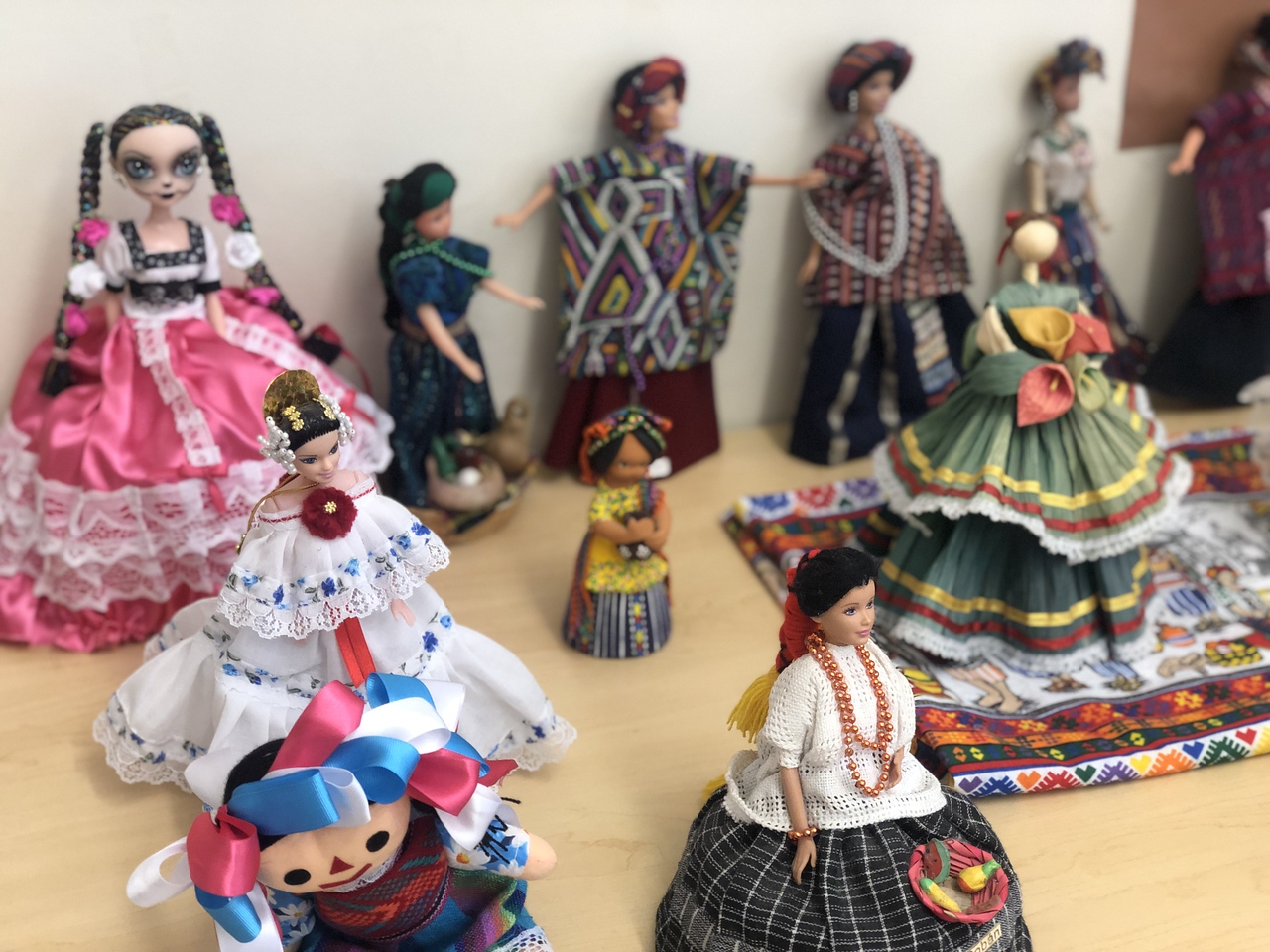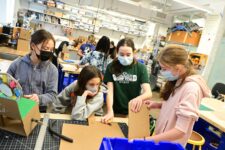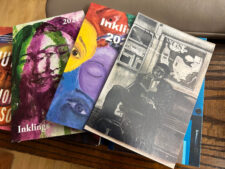In September, Fieldston Upper Spanish teacher Lorena Rodas-Ramírez and the Latinx student affinity group organized an assembly to honor and celebrate Latinx Heritage Month. The theme of this year’s Latinx Heritage Month is “Unidos” or “United”: Inclusivity for a Stronger Nation.

Latinx Heritage Month, celebrated in the United States between September 15th and October 15th, recognizes and honors the enduring contributions of Latinx/Hispanic Americans and recognizes the many heritages and cultures of U.S. citizens from or with ancestors from Mexico, the Caribbean, Spain, and Central and South America. The anniversaries of the independence of several Latin American countries, including Costa Rica, El Salvador, Guatemala, Honduras, Nicaragua, Mexico, and Chile fall within this 30-day timeframe.
During the assembly, students shared personal testimonies, poetry, and the history of Latinx activists and celebrated the vibrant Hispanic community through traditional song and dance — there was even a special guest appearance from a traditional Latin music band, Cuarteto Guataca. At the end of the assembly, Rodas-Ramírez and science teacher Juan Botella performed La Bamba and extended an invitation to the entire community to jump on stage and dance!
…
When you enter Rodas-Ramírez’s classroom, which overlooks the Quad, the connection she shares with her students is palpable.
Despite the joy of song, dance, and community that is so essential to Latinx culture, in her classroom, Rodas-Ramírez encourages students to also engage in thought-provoking and — at times — difficult conversations. The Spanish for Heritage Speakers curriculum at Fieldston Upper is complex, thoughtful, and comprehensive. Over the course of the academic year, Rodas-Ramírez incorporates Latin American and Latinx history and literature, social and environmental justice issues, discrimination and marginalization, racism, immigration, the history of the fight for land and resources by the indigenous people of Latin America, and so much more into her lessons.

11th Grade and 12th Grade students in the Heritage Speakers II class recently read “Los niños perdidos” (the English version of the text is titled “Tell Me How It Ends”) by Mexican author Valeria Luiselli and engaged in thoughtful discussion about the text.
Students at ECFS only speak the target language in higher-level language classes, so Rodas-Ramírez provided a translation that offers a glimpse into the space she creates for her Latinx students to freely contemplate and engage in discussion:
“Llevamos dos o tres clases conversando sobre el primer capítulo (“Frontera”), que nos narra en detalle el viaje de pesadilla — alto riesgo de secuestro, agresión sexual, tráfico de personas, muerte, entre otros tantos horrores — que los niños migrantes centroamericanos tienen que vivir desde que salen de su país de origen hasta llegar a la frontera entre México y Estados Unidos. Leer este libro no es fácil para nosotros; tampoco comentarlo o hablar de las historias terroríficas que nos cuenta y de la absoluta crueldad del sistema de inmigración que describe.”
“We’ve spent two or three classes talking about the first chapter (“Frontera”), which tells us in detail about the nightmarish journey — with a high risk of kidnapping, sexual assault, human trafficking, and death, among many other horrors — that Central American migrant children have to live through when they leave their country of origin until they reach the border between Mexico and the United States. Reading this book is not easy for us. Neither is it easy to comment on nor talk about the terrifying stories that it tells us and the absolute cruelty of the immigration system that it describes.”

“Joshua P. ’24 inició nuestra conversación refiriéndose al impacto que tuvo en él leer sobre el enorme porcentaje de mujeres y niñas migrantes que son agredidas sexualmente en su paso por México. Nos dijo que, a pesar de que lamentablemente no se sorprendió de la situación, de igual manera se sintió afectado por las cifras.”
“Joshua P. ’24 started our conversation by referring to how it had impacted him to read about the huge percentage of migrant women and girls who are sexually assaulted while passing through Mexico. He told us that, although he was unfortunately not surprised by the situation, he was equally affected by the figures.”
“Gabriela A. ’24 hizo énfasis en el tipo de violencia normalizada en los Estados Unidos así como en la total ignorancia y falta de comprensión de cuán diferente es la violencia que se vive en los países de donde vienen los niños migrantes y los grados, formas y niveles que alcanza, inimaginables para la mayoría de estadounidenses.”
“Gabriela A. ’24 emphasized the normalization of a certain type of violence in the United States as well as the total ignorance and lack of understanding of how different the violence is that people experience in the migrant children’s native countries and the degrees, forms, and levels that this violence reaches, which is unimaginable to most U.S. citizens.”
“Milán S. ’24 aludió a la manipulación de la información creada por los grupos de poder en los momentos en que se genera algún tipo de crisis — o varias a la vez — con el fin de crear división y odio entre la población.”

“Milán S. ’24 alluded to the manipulation of information by powerful groups during times of a major crisis — or several at the same time — in order to create division and galvanize hate among the population.”
“Kiara M. ’23 expresó su inmensa frustración en relación con el hecho de que, cuando las mujeres son abusadas, agredidas sexualmente o asesinadas, se hable siempre de que “son las hijas o hermanas de alguien”, cuando en realidad lo que importa es que son seres humanos. También se expresó sobre el dolor que le provoca saber que para muchas personas el libro que estamos leyendo es solamente eso: un libro, sin darse cuenta de que lo que ahí se describe es la cruda realidad y el horror que viven día a día miles de niños migrantes.”
“Kiara M. ’23 expressed her immense frustration that when women are abused, sexually assaulted, or murdered, people often respond that “[these women] are someone’s daughters or sisters.” Kiara expressed that what matters is that these women are human beings. She also relayed the pain she feels upon knowing that, for many people, the book we are reading is just that: a book. People don’t realize that what is described here is the harsh reality and horror that thousands of migrant [adults] and children live in every day.”
“Ashley Á ’23 comentó sobre la “suerte” que tuvieron los niños migrantes mencionados en el libro, de que haya sido Valeria Luiselli la que los haya entrevistado en su labor como traductora, no sólo porque el español es también su lengua materna (Luiselli es mexicana) sino, sobre todo, porque ella conocía de cerca el contexto histórico que había provocado la llegada masiva de niños centroamericanos a la frontera entre México y Estados Unidos en el verano del 2014 y su bienestar y la suerte que corrieran le importaban verdaderamente.”
“Ashley Á ’23 commented on how ‘lucky’ the migrant children were that it was Valeria Luiselli who interviewed them in her work as a translator, not only because Spanish is also her mother tongue (Luiselli is Mexican) but above all, because she was familiar with the historical context that had caused the massive arrival of Central American children at the border between Mexico and the United States in the summer of 2014. Their well-being and fate truly mattered to her.”
“Isa V. ’23 manifestó su profundo enojo ante el Plan Frontera Sur implementado por el gobierno de México para detener a los migrantes centroamericanos en su paso por territorio mexicano y que incluye, entre otras cosas, drones, controles de todo tipo y agentes de gobierno encubiertos que se hacen pasar por miembros de organizaciones humanitarias que ayudan a los migrantes con el fin de atraparlos y deportarlos a sus países de origen.”
“Isa V. ’23 expressed her deep anger at the Southern Border Plan implemented by the Mexican government to detain Central American migrants as they pass through Mexican territory and which includes, among other things, drones and undercover government agents who pose as members of humanitarian organizations in order to catch migrants and deport them to their countries of origin.”
“Lucas G. ’23, aunque hoy no participó en la conversación, se mantuvo atento a los comentarios de sus compañeros, absorbiéndolo todo.”
“Although Lucas G. ’23 did not participate in today’s conversation, he remained attentive to the comments of his classmates, absorbing everything.”
Despite the difficult subject matter that students had discussed, an air of vulnerability, connection, and understanding permeated the room as the conversation wrapped up.
…

At the close of the Latinx Heritage Month assembly, Rodas-Ramírez was able to share an important message with the ECFS community: “A pesar de todos los intentos de marginalizarnos, destruirnos y borrarnos de la historia, nosotros los latinos seguiremos levantando la voz para pronunciar y defender nuestra verdad y nuestro derecho a vivir con dignidad; seguiremos peleando, resistiendo, soñando, riendo, cantando, bailando, floreciendo!”
“Despite every attempt at marginalizing and destroying us, and erasing us from history, we, Latinx people, will continue to raise our voice to speak and defend our truth and our right to live with dignity; we will continue to fight, to resist, to dream, to laugh, to sing, to dance, to thrive!”




